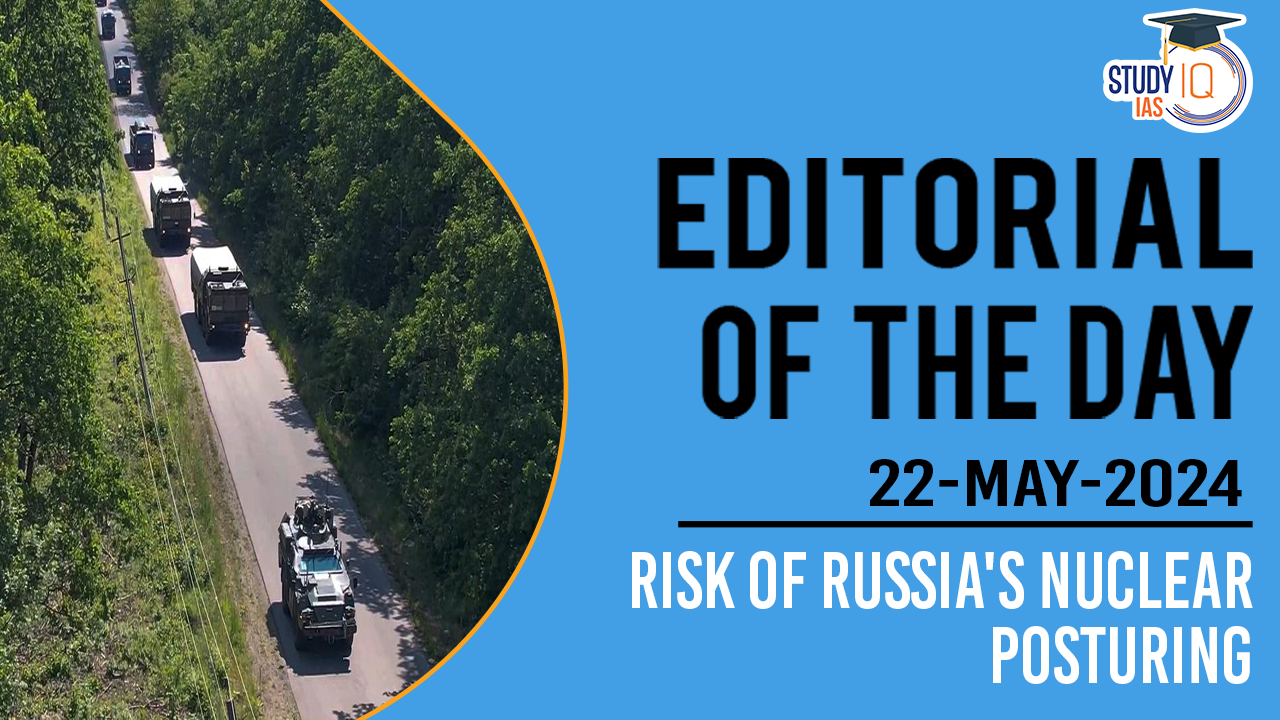Table of Contents
Context
- The Russia-Ukraine war has entered its second year with no end in sight.
- Russia announced plans to hold drills simulating the use of tactical nuclear weapons along the Ukrainian border.
- In March, Russia declared it would station nuclear weapons in Belarus, indicating nuclear posturing during the conflict.
Justifications and Responses
- Russia cited statements from leaders aiding Ukraine as reasons for its nuclear posturing:
- French President Emmanuel Macron suggested potential troop deployment to Ukraine.
- British Foreign Secretary David Cameron mentioned Ukraine’s use of British long-range weapons to strike inside Russia.
- Russia’s claims that these statements pose an existential threat are seen as exaggerated and indicative of brinkmanship rather than genuine security threats.
Shift in Understanding of Nuclear Deterrence
- Historically, nuclear deterrence is based on the principle of mutually assured destruction, where any nuclear use would lead to massive destruction on both sides.
- Nuclear weapons were reserved for existential threats.
- Russia’s willingness to consider nuclear options in a non-existential threat context represents a significant shift in nuclear deterrence principles.
- This shift undermines the clear distinction between nuclear and conventional warfare.
Dangerous Precedents
- Russia’s nuclear threats at lower conflict levels could set a precedent for other nuclear powers to use nuclear weapons as coercive tactics.
- Smaller nuclear-armed nations might feel emboldened to threaten nuclear use to deter stronger conventional military opponents.
- Countries like Iran and North Korea might reconsider their nuclear policies, feeling encouraged to develop or maintain nuclear arsenals to deter threats.
Impact on Non-Proliferation Efforts
- Russia’s actions could undermine global non-proliferation and disarmament efforts.
- The war highlights the vulnerability of non-nuclear states to aggression from nuclear-armed states.
- Ukraine’s decision to give up its nuclear arsenal in the Budapest Memorandum now appears ill-advised, as security assurances from nuclear powers proved ineffective.
- Iran has hinted at revisiting its nuclear doctrine in response to perceived existential threats from Israel, which could further undermine non-proliferation efforts.
- Smaller nations might be discouraged from pursuing disarmament, fearing nuclear aggression.
Implications for Global Security
- The war has created a new nuclear flashpoint, altering the understanding of nuclear deterrence.
- Russia’s actions demonstrate how nuclear weapons can provide asymmetric advantages in conventional warfare.
- This increases proliferation anxieties, especially in regions with long-standing tensions between states.
- The potential for nuclear war could overshadow deterrence, leading to an increase in nuclear proliferation and instability globally.


 Elon Musk’s America Party: A New Chapt...
Elon Musk’s America Party: A New Chapt...
 Bihar Assembly Election 2025: Complete G...
Bihar Assembly Election 2025: Complete G...
 17th BRICS Summit 2025: India’s Leader...
17th BRICS Summit 2025: India’s Leader...





















